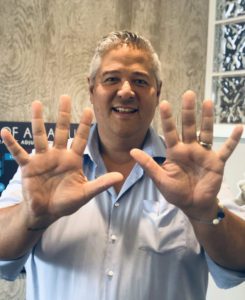Pain while studying is more common than you think.
Exam time is understandably stressful time for students. While there is often an emphasis on the importance of diet and exercise during this time, students should also be mindful of their posture to avoid pain while studying.
While studying students spend a lot of time sitting at a desk or leaning over while writing or researching on the internet leading to poor posture while seated which is the most prevalent cause of back pain.
Preventing back pain is possible by becoming more aware of your posture.
Here are a few tips to avoid back and neck pain while studying for those important exams;
• Recognise when you are slouching and correct posture
• Your head should be in an upright position
• Get a comfortable supportive chair which will take pressure away from the lower back and make it easier to sit in front of your desk for prolonged periods
• Where possible, work on a PC rather than a laptop – the monitor should be an arm length away
• Every 30 – 40 minutes remember to take breaks. Go for a short walk, get fresh air and stretch
• Perform shoulder shrugs and rolls to reduce tension in the shoulder blade and neck muscles. We suggest to do these 3 simple stretches to counteract the sitting pose.

When we’re stressed we tend to tighten up – hence why sometimes people will say they feel knots in the shoulders.
By planning ahead you can avoid getting too stressed out.
Write a plan of action for the next few weeks, plan breaks within your study time-table and make time for exercise and enjoyable things – be it a phone-call to a friend, watching your favourite programme or enjoying the glorious sun we are always promised during exam time.
Dr. Ben and all the team at Optimal Chiropractic Ballincollig in Cork would like to wish all those sitting exams the very best of luck and success.














24 Responses
I followed your tips and they have helped me a lot in reducing my neck pains.
That’s wonderful, delighted it helped you!
I appreciate that you mention to take a break every 30-40 minutes. I can see why this would allow your muscles to stretch out and not become tight. I found it useful to have an alarm go off when I am working on a big project. If I don’t have that alarm, then I tend to forget to take those breaks and work for hours on end.
Yes Scott, definitely the alarm is a great idea. Another idea is to break it down into 25minute chunks, set the alarm, take a 5 minute break and then do another 25 minutes but on a different task/subject/project. Helps to stay sharp and productive.
Thank you for the ways of avoiding back pain . I will keep them in mind while sitting to study the next time.
Hi Marina,
thank you for letting me know that it helped. Best of luck with your study!
I have severe neck pain only after 15 minutesof studying. It become severe when i am writing anything. I am a physics student I have to write notes and solve numerical problems. How to manage this. Please help
I would definitely recommend that you get your back checked by a chiropractor as soon as possible. 15 minutes is a very short time for you to be sitting before the pain comes on. In the meantime, I would recommend you change position regularly while you are studying. Go from sitting to standing and maybe look to setup or invest in a standing desk that would reduce the amount of time you need to sit while you study.
Ben.
Hie Ben. I have neck pains that often lead to involuntary nodding and headaches while studying or taking exams. Sometimes it gets so bad I feel as though I’m functioning at half my original mental capacity. What would be your advice on such a case sir?
Hi Baz,
Neck pain and headaches are a very common occurrence especially with people who spend prolonged periods of time sitting at a desk. While studying, we have a tendency to hunch forwards which causes a large increase in pressure at the base of our neck and across our shoulders. I would suggest that you need to start becoming more aware of your posture while sitting and also take regular rest breaks. Every 45 minutes you should stand up, walk around and do a number of stretches to try to loosen out your neck. I would also highly recommend that you get your spine checked by a qualified chiropractor to see if there are any underlying issues that need to be resolved.
Ben.
Really nice, helpful and easy to implement tips. Will definitely put them into account while studying!
Glad it was helpful Rana – best of luck with your study!
I get neck and shoulder pain after only 15 minutes of studying and it get worse after awhile i m so stressed out right now what can i do to get rid of it? plz help me
Hi Eman, make sure you reset your posture regularly so that you keep sitting up straight. Take regular breaks. Consider getting a massage or a full consultation with a chiropractor in your area.
Is there something I can put on my chair, if I can’t get a new one? I’ve been using a pillow which has helped a little bit not a lot 🙁
Hi, you could consider investing in a lumbar support which would definitely be more sturdy than a pillow.
Hello Dr. Ben.How do I relieve trapezoid muscle pain due to long hours of studying?
Hi, it’s really important to keep an eye on your desk ergonomics. Set yourself up correctly when you study and take regular breaks to avoid the risk of muscle pain. Consider massage to relax the muscles or a full assessment with a Chiropractor to correct any spinal misalignments in your upper back or neck that could be leading to pain.
Hello, I’m a medical student I have to sit for hours and hours studying.I am only 22 and I am suffering from severe neck and lumbosacral pain due to continuous sitting at a place for 6,7 hours.Kindly suggest me how can I get rid of this pain.
Hi Sidra, I would recommend to start by taking more breaks while you’re studying. To get rid of the pain I would suggest you contact your local chiropractor to see how they could help correct the problem.
hello!
I found this to be a very interesting article. I wanted to know what to do if the right part of your back near your right should hurt when you sit straight and study/write for too long? Like the pain spreads to the neck, slowly to the elbow, like spreading, when water pours down your hand, slowly. the pain is mostly concentrated on the right side of my spine, as I am a right-hander… i use a pillow when I sit cause it gives comfort. Would it be alright if I change my posture or something??
PS: this article is really well written and I really loved it.
Thank you for your message. I would highly recommend you seek help from a local chiropractor to get your spine assessed. It sounds like your posture is affecting your neck and hence radiating pain further down your arm/hand. This should be fixable with the right help.
My daughter is wondering whether it is worth investing in a really good chair to prevent her upper back shoulder and neck pain – would you try the other things first?
Hi Debbie, anyone who is sitting at a desk for extended periods of time should have a top quality chair. Whether you are studying or working from home it is definitely worth investing as much as your budget will allow on the right equipment